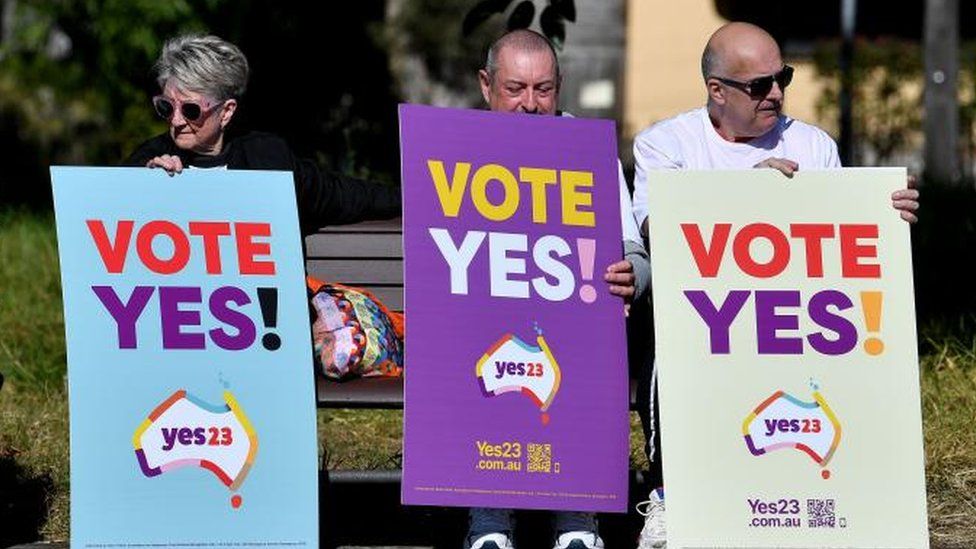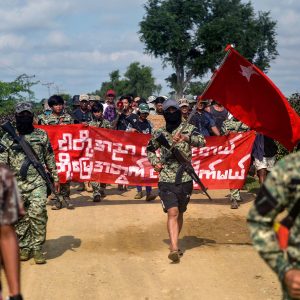The Australian Aboriginal people were victims of terra nullius: the driving principle behind much of European colonial ventures meaning “no one’s land.” Despite their 65,000-year history in the lands of Australia, the Indigenous population faced displacement upon the arrival of unfamiliar people, culture, and languages from Europe. From a Eurocentric standpoint, the “barbaric” behavior of the Indigenous population warranted forced usurpation of tribal lands. Such tensions have withstood the test of time in modern Australia, culminating in the nation’s most recent national referendum.
Background
Widely known as the “Indigenous Voice” vote, the proposition entailed the integration of Aboriginal people into Australia’s parliamentary government. Revolving around the idea of an advisory council to Australia’s pre-existing members of Parliament, the referendum would have granted the Indigenous population an important opportunity to put forth their concerns for political matters pertaining to their well-being and livelihoods. With Indigenous people comprising 4 percent of Australia’s total population, this non-trivial proportion of people would be re-enfranchised into a realm of decision-making regarding what was previously theirs.
The referendum enjoyed widespread support from the Indigenous population, who perceived the idea as a form of reparation for the historic injustices they have faced from European settler colonialism. However, such optimistic attitudes were subdued when a supermajority of Australia’s citizenry—60 percent—rejected the motion. The opinions were held universally, as a breakdown of data demonstrated none of Australia’s six states successfully passed the referendum. Underlying these demoralizing statistics is a rationale that poses a concerning threat to the Aboriginal people’s communities and welfare: a widespread misinformation effort.
The Spread of Misinformation
Due to substantial campaigns with audiences built throughout the COVID-19 pandemic, many opposing voices have amplified misinformation regarding the referendum through these platforms. For instance, the notion that Indigenous people would seek to reclaim their land by displacing Australians from their own homes has been at the forefront of “no” votes. The belief stands that land would be seized and redistributed to Indigenous populations amortized over a gradual 20-year period to avoid sudden shifts to the social and economic fabric of Australia. However, the proposition put forward by the referendum is merely creating an advisory body to the parliament, meaning they do not wield concrete powers to veto or pass legislation to instigate such change.
Along the lines of such logic, Australians were led to cast doubt upon the legality of the referendum due to the perception of the advisory body as an additional chamber of Parliament. Following the Australian Parliament’s 122-year history of House and Senate, the citizens were reluctant to relinquish such a key point of consistency. However, such misinformation neglects the fact that an advisory body does not possess the same degree of authority as the main chambers of Parliament, making it a problematic rationale for opposition campaigns to utilize.
Lastly, social media presence for the “no” camp is allowing them to make claims that the United Nations will forcibly take over Australia, which remains blatantly untrue. Thus, fears of an apartheid government presided over Australians’ push against this referendum.
The Spread of “Trump Style” Misinformation
The most conspicuous parallel to this pivotal moment in Australia’s political history is that of the United States during the Trump presidency. In the midst of the pandemic and subsequent misinformation campaign galvanized by the president himself, fear and blind reliance on figures of authority largely dictated many Americans’ actions. Misinformation campaigns were undertaken by individuals and interest groups altogether on social media platforms and beyond, ultimately undermining the scientific principles behind the pandemic response. As an inevitable result, the country began to divide into factions, leading to a snowball effect of polarization that continues to bleed into many pressing issues facing the United States today.
This broader trend of political misinformation, deception, and polarization has begun manifesting itself in countries abroad, as exemplified by Australia’s Indigenous referendum. Misinformation about compromising the Australian people’s houses, land, and voice in government has created echo chambers in which no intervention can feasibly cease the feedback loop. Should Australia continue to devolve its democracy in this manner, the nation may be looking at a bleak future of polarization and ineffective government.
Root Cause
Beyond the misinformation, another potential overarching explanation behind many Australians’ resistance to Indigenous integration is their shame when it comes to their history of colonialism. Many promises have been made to restore parity to Indigenous populations, who lag behind Australian citizens when it comes to key metrics of development, including health, economic welfare, and education. However, no noticeable or significant change has been implemented to assist with this process. When surveyed, citizens were often cited expressing this gap as a source of “national shame.”
As a result of such shame, citizens may collectively be resorting to victim-blaming for the state of their nation, which may be the root cause of the overwhelming “no’s” for the Voice referendum. However, the reality stands that the Indigenous population simply wish to bridge the discrepancies they face on almost all aspects of everyday life, including life expectancy, suicide rates, incarceration rates, and more by helping direct the trajectory of national politics. With white Australians systematically stripping them of their culture, making government welfare inaccessible, and even perpetrating massacres, the Aboriginals are fighting an uphill battle for equity. The decision on the Voice referendum is a superficial representation of Australians’ deep-rooted shame tied to their historic injustices and wrongdoings, as well as an indicator that Trump-style misinformation has transcended the United States’ national borders. While such issues do not have a silver bullet solution, the nation must continuously work—government and people alike—to deconstruct their history of colonialism and integrate Indigenous populations into the decision-making process for their country.
Featured Image Source: BBC






Comments are closed.